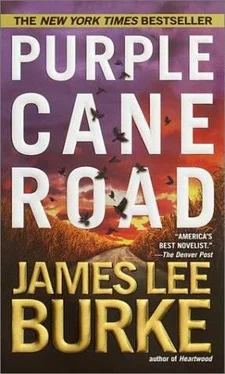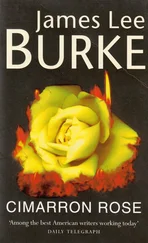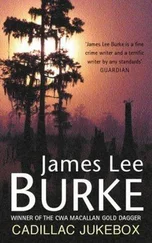WEDNESDAY EVENING ALAFAIR was eating at an outdoor table at the McDonald's on East Main when a red car pulled into the parking lot and a young man wearing a freshly pressed white shirt and starched khakis and sunglasses and a straw hat got out and walked toward her.
He stood in front of her, the fingers of one hand touching the tabletop, his face expressionless behind his sunglasses.
"Can I sit down?" he asked.
"You shouldn't be here, Johnny. People are looking for you," she replied.
"That's nothing new." He glanced over his shoulder at a Cherokee rilled with high school kids in the parking lot. They were listening to white rap music that beat like a fist on the walls of the restaurant. He sat down at the table. "Take a ride with me."
"Dave says you beat up a black woman in the Loreauville Quarters. For no reason," she said.
"I'm sorry about that. I got strange stuff that goes off in my head sometime. I told the woman that. That's the way it flushes sometime."
The rap music from the Cherokee increased in intensity. He turned irritably and glared at the kids inside the vehicle. One of them threw a box of trash out on the pavement. Alafair looked at Remeta's hands. For some reason they weren't like those of an artist any longer. They were knobbed with bone and they curled spasmodically into fists, as though he wanted to crush something inside them. He turned back to her and stared at her expression.
"You got something on your mind?" he asked.
"Your arms are sunburned," she said.
"I was out on Lake Fausse Pointe. It's full of herons and cranes and flooded cypress. It's beautiful."
"I have to go now."
"No," he said, and placed his hand across her wrist. He leaned toward her, his mouth parting to speak, but the kids in the Cherokee had turned up their stereo even louder and he looked at them again over his shoulder. A pop can flew out of the Cherokee's window and clattered across the pavement.
"Wait here a minute," Remeta said, and got up from the table.
He walked to the Cherokee and picked up all the Styrofoam cups and hamburger containers and dirty napkins that had been thrown on the pavement and stood with them at the driver's window.
"Turn off the radio," he said.
The high school kid behind the wheel stopped talking to the others in the vehicle and looked dumbly at Remeta, then began turning down the dial on the stereo until the sound bled away into silence.
"You guys are seriously pissing me off," Remeta said, pushing the trash through the window. "The next time I see you throwing garbage on the ground, I'm going to kick the shit out of you. And if I hear that rap music again, I'm going to tear your stereo out of the dashboard and shove it up your ass. Now get out of here."
The driver started the Cherokee, grinding the starter, and bounced out onto the street, while his passengers looked back white-faced at Remeta.
He sat back down at the table, his eyes following the Cherokee down the street.
"That was mean," she said.
"They deserve worse."
"I'm going to the library now."
"I'll drive you there. We can meet later."
"No."
"I had to shoot that guy. The one in the fire in New Orleans. He was sent to kill me."
"Don't tell me about it. It's disgusting."
There were shards of color in his cheeks and throat.
"I can't believe you're talking to me like that. Who did this to us, Alafair?" he said.
"You did. Go away, Johnny."
She could not see his eyes through his dark glasses, but his head protruded on his neck toward her, and his breath seemed to reach out and touch her cheek like a dirty finger.
Then he drew his hand back off the table, his skin squeaking on the surface.
"The vase I gave you? I want you to break it. You're not one of the people in that painting anymore, Alafair," he said.
He got up from his seat and stared down at her, his silhouette motionless against the late sun. She could see her reflection in his glasses. She looked small and diminished, her image distorted, as though it were she who was morally impaired and not he.
After a long moment, as though he had reviewed his judgment, he said, "You're just a little traitor. That's all you ever were."
She waited until he had driven out of the parking lot, then went to the pay phone and dialed 911.
Two DAYS later Wally, the dispatcher, buzzed my office phone.
"There's a guy out here says he's Goldie Bierbaum from New Orleans," he said.
"Send him back."
"Didn't he fight Cleveland Williams?"
"Goldie fought everybody."
A minute later I saw Goldie at my door. Even though he was almost seventy, his chest was still flat-plated, his muscular thighs wider than his waist. Before he had opened his saloon on Magazine back in the 1960s, he had fought in three weight divisions and had been a contender in two.
Goldie sat down and put a gumball in his mouth and offered the remaining one in his palm to me.
"Not right now," I said.
"That button man you were looking for, the one who did Zipper Clum, you still after him?" he asked. His few strands of hair were coated with gel and looked like copper wire stretched across his scalp.
"Yeah, he's a real headache," I said.
"I hear he's been living on Camp Street. He boosts cars all over the neighborhood, like the Garden District is the Hertz company."
"Thanks, anyway, Goldie. That place burned down last week. Our man has moved on."
"You're kidding?"
"Why didn't you report him to NOPD?"
"I don't have a good history with those guys."
"Tell me, you remember a cop named Jim Gable, from back in the sixties?"
"Sure. He was a bum."
"In what way?"
"He did scut work for the Giacanos."
"You positive about that?"
"Hey, Dave, I got into Didoni Giacano for ten large. The vig was four hundred a week. You know how it works. The principal don't ever go down. I was late a couple of times and Gable came by and picked it up. He'd leave the woman in the cruiser and drink a cup of coffee in back and talk about the weather like we were old friends. But he was a bum."
"What woman?"
"She was a rookie. Maybe she didn't know what was going on. She's big shit in Baton Rouge. You know, what's-her-name, Deshotel, she's the attorney general now."
That same evening Jim Gable told his wife he was going to cut his losses, take early retirement, and move the two of them to New Mexico. Dana Magelli had actually sicced IAD on him. Could you believe it? Two plain-clothes picked him up in the mayor's office and grilled him down at the district like a perp. A pair of polyester desk pilots who smelled like hair oil and made grade by jamming up other cops.
"What's your association with Maggie Glick?" one of them asked.
"I don't have one."
"That's not what she says."
"Let me give you guys a short history lesson," Gable said. "This used to be a good city. We knew who and where everybody was. People say they don't like vice. What they mean is they don't like it uncontrolled. We'd tell the dagos somebody was out of line and they'd throw him off a roof. Muggers got their noses broken with a blackjack. The whores didn't spread clap through the tourist trade. That's the way the old days were, boys. Go back to Dana Magelli and tell him to open a fruit stand."
Jim Gable stood in his den, surrounded by his collection of ordnance, and drank from a glass of whiskey and ice. He opened a mahogany humidor and took a plump cigar from it and gingerly bit off the tip and lit it.
He could probably get around the IAD investigation. He was too high up in the department, too long term, and he knew too many secrets about the misdeeds of others to be a sacrificial offering now. When a police department got hosed, a few street cops and midlevel functionaries took the heat and did the time, if any indeed was ever forthcoming.
Читать дальше












